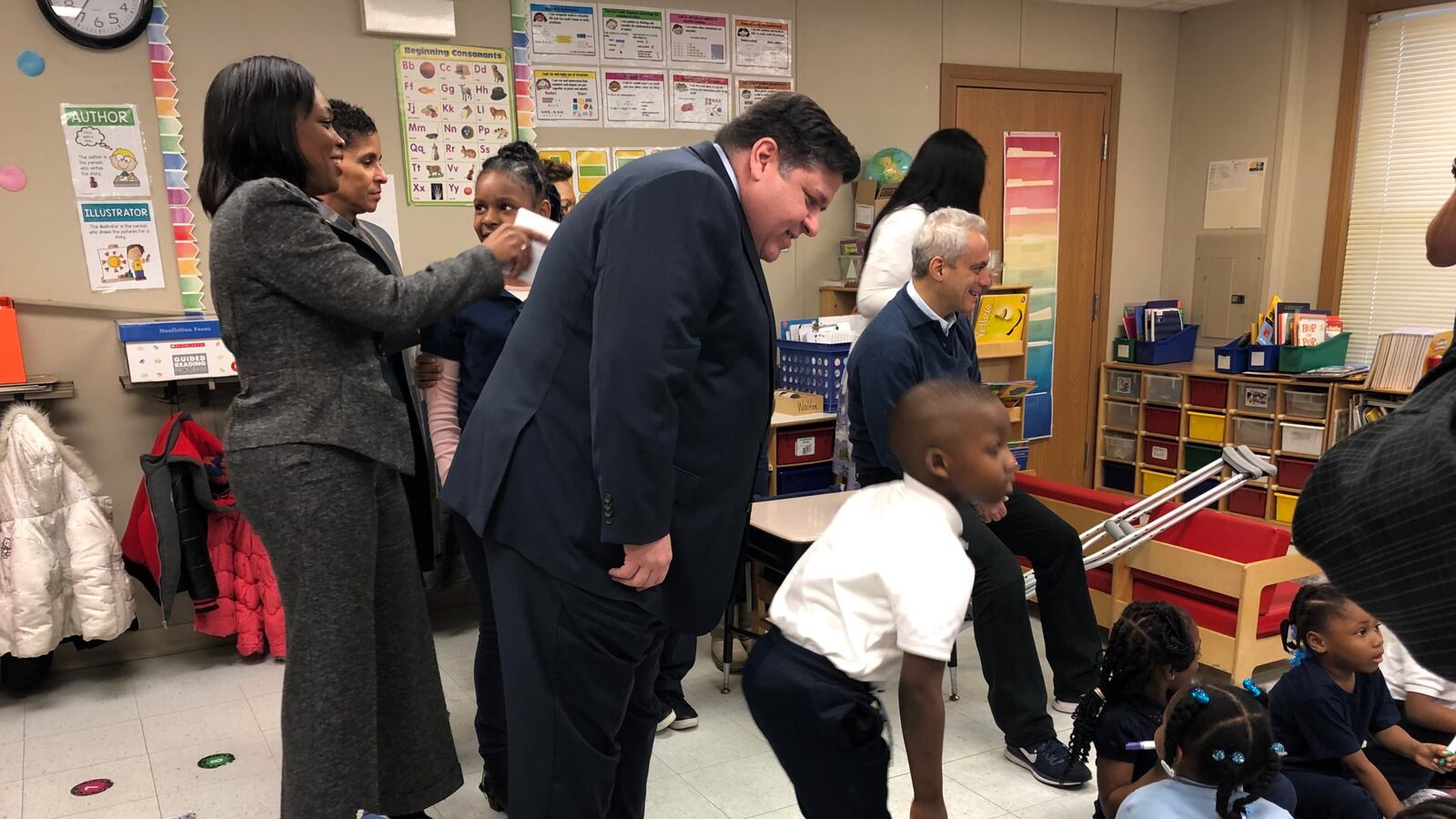After spending much of his first year in office trying to stamp out Illinois’ chronic budget fires, Gov. J.B. Pritzker is moving toward rebuilding the state’s fragmented early education system.
On Monday, the governor named a 29-person commission tasked with tackling the billion-dollar question in state education: How to have the biggest impact with limited funds. Illinois spends an estimated $1.5 billion in state and federal money on children under 5, but those dollars are not spent evenly around the state and reach only a fraction of babies, toddlers, and preschoolers.
Introducing the commission at the Carole Robertson Learning Center, the governor said he had set an audacious goal: “Illinois will become the best state in the nation for families raising young children.”
Pritzker also said he plans to raise reimbursement rates by 5% for a child care program used by low-income working families to subsidize the cost of infant care, day care, and some extended after-school programs for older children. The program lost providers and children during the administration of his predecessor, Bruce Rauner.
Pritzker plans to direct even more dollars — to total a 20% rate increase — to providers downstate who’ve been hit with a staffing crisis and have closed classrooms.
The financing commission has its work cut out for it. The issue of early childhood financing will likely prove a tough question to answer in a state that spends $1 on infants, toddlers, and preschoolers for every $5 it spends on K-12. How to streamline the disbursement of state and federal dollars to reach more children — and, more important, to ramp up child care spending in a state grasping for revenue — is the central question facing the group.
Dominated by state senators and representatives whose buy-in would ultimately be needed to legislate significant changes, the commission also includes providers, advocates, district superintendents, and policymakers. The four co-chairs are Barbara Flynn Currie, the former state House Democratic majority leader; George Davis, the former executive director of Rockford Human Services Department; Andy Manar, a state senator who helped lead the charge to revamp the state’s funding formula for K-12 in 2017; and Jesse Ruiz, the deputy governor for education and a former vice-president of Chicago’s school board.
Pritzker told Chalkbeat in March that, despite encountering a significant structural deficit when taking office, he still planned to pave a path to statewide universal pre-K in his first term, a pledge he made during his campaign.
Illinois has long been recognized for its emphasis on quality early education. But it has struggled to build a system that reaches enough low-income children and even backslid in recent years with how many families it serves. A report released in October from the policy group Advance Illinois showed that only about half of low-income children under age 5 in Illinois were enrolled in any sort of publicly funded early education program, and some pockets of the state had no programs at all.
A similar sobering statistic has become a cri de coeur among early childhood advocates since Illinois began tracking kindergarten readiness. Only 1 in 4 children showed up in 2019 for kindergarten prepared for school, based on three critical benchmarks.
In announcing the commission, Pritzker said Monday that it largely would not address Chicago’s universal pre-K rollout.
“The commission won’t directly involve itself, I don’t think, in the matters of Chicago, although no doubt some of its members will opine on how the funds were distributed,” he said in response to a question. He said the city already had responded to some criticism — presumably referring to a funding extension through next June for some providers who lost funding after the city changed how it distributes state dollars.
In addition to the co-chairs, here are the other commission members named Monday.
- Emma Ahiable, prekindergarten teacher, Springfield District 186
- Carmen Ayala, superintendent, Illinois State Board of Education
- Christopher Belt, Illinois state senator, D-Centreville
- Thomas Bennett, Illinois state representative, R-Gibson City
- Kristin Bernhard, senior vice president, Ounce of Prevention Fund
- Patricia Chamberlain, retired educator
- Will Davis, Illinois state representative, D-Homewood
- Donald DeWitte, Illinois state senator, R-St. Charles
- Shauna Ejeh, senior vice president for programs, Illinois Action for Children
- Craig Esko, senior vice president, PNC Bank
- Phyllis Glink, executive director, Irving Harris Foundation
- Rochelle Golliday, executive director, Cuddle Care
- Rey Gonzalez, president and CEO, El Valor
- Christina Hachikian, executive director, Rustandy Center for Social Sector Innovation, University of Chicago Booth School of Business
- Grace Hou, secretary, Illinois Department of Human Services
- Lori Longueville, director, Child Care Resource and Referral, John A Logan College
- Cathy Mannen, union professional issues director, Illinois Federation of Teachers
- Bela Mote, Chief Executive Officer, Carole Robertson Center
- Evelyn Osorio, Child Care Field Coordinator, SEIU Healthcare
- Aaron Ortiz, Illinois State Representative, D-Chicago
- Elliot Regenstein, Partner, Foresight Law + Policy
- Trish Rooney, Director of Early Childhood Initiatives, Fox Valley United Way
- Jodi Scott, Regional Superintendent of Schools
- Robin Steans, Executive Director, Advance Illinois
- Jim Stelter, Superintendent, Bensenville School District 2

